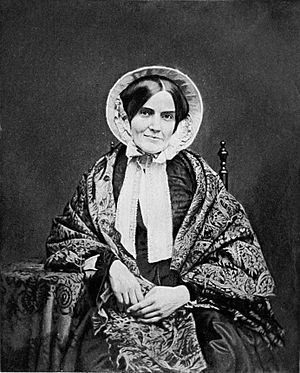Delia Bacon facts for kids
Quick facts for kids
Delia Salter Bacon
|
|
|---|---|

Delia Bacon, from a daguerreotype taken in 1853.
|
|
| Born | February 2, 1811 Tallmadge, Ohio, U.S. |
| Died | September 2, 1859 (aged 48) |
| Resting place | Grove Street Cemetery, New Haven, Connecticut, U.S. |
| Occupation | writer of plays and short stories; Shakespeare scholar |
| Language | English |
| Nationality | American |
Delia Salter Bacon (born February 2, 1811 – died September 2, 1859) was an American writer. She wrote plays and short stories. She is most famous for her ideas about who really wrote William Shakespeare's plays. Delia believed that important thinkers like Francis Bacon (no relation to her) and Sir Walter Raleigh were the true authors.
Delia's research in Boston, New York, and London led to her main book. It was called The Philosophy of the Plays of Shakspere Unfolded. Famous writers like Harriet Beecher Stowe, Nathaniel Hawthorne, and Ralph Waldo Emerson admired her. Emerson even called her "America's greatest literary producer" at the time of her death.
Contents
About Delia Bacon
Delia Bacon was born in a simple log cabin in Tallmadge, Ohio. She was the youngest daughter of a Christian minister. Her family moved back to New England when she was young. Her father died soon after.
Her family did not have much money. Only her older brother could go to college at Yale. Delia's own schooling stopped when she was fourteen. She became a teacher in schools in different states. Later, she became a respected lecturer. She taught history and literature to women in Eastern U.S. cities.
Early Writings and Plays
When she was 20, in 1831, Delia published her first book. It was called Tales of the Puritans. It had three long stories about early American life. In 1832, she won a short-story prize. She even beat Edgar Allan Poe in the competition.
In 1836, she moved to New York and loved going to the theatre. She met a famous actress named Ellen Tree. Delia convinced Ellen to act in a play she was writing. The play was called The Bride of Fort Edward. However, the play was never performed. It was published in 1839. Some reviews were good, but it did not sell well.
Later Life and Challenges
Later, Delia faced some personal challenges. She had to leave New Haven, Connecticut, due to public opinion about a friendship. She suffered from an illness in her later years. Her family placed her in care in England, and then she returned to America.
Delia Bacon died in 1859 in Hartford, Connecticut. She is buried in Grove Street Cemetery in New Haven, Connecticut.
Who Wrote Shakespeare?
In 1845, Delia Bacon stopped lecturing. She began to deeply research a new idea. She believed that William Shakespeare did not write all the plays attributed to him. It took her ten years to publish her book, The Philosophy of the Plays of Shakespeare Unfolded, in 1857.
Her Theory Explained
During this time, many people were questioning who wrote old texts. Delia was influenced by these ideas. She thought Shakespeare's plays were deep philosophical works. She found it hard to believe they were written just for money or for a general audience.
Delia believed that a group of smart men wrote the plays. This group included Francis Bacon, Sir Walter Raleigh, and Edmund Spenser. She thought they wrote the plays to share important ideas. They felt they could not openly share these ideas themselves.
She also learned about secret codes from her friend Samuel Morse. This made her think that the plays might contain hidden messages. Delia thought the plays were a secret way for these thinkers to express their views. She believed they were speaking out against the rulers of their time.
Reactions to Her Ideas
Many people did not agree with Delia's ideas. Some even looked down on her. However, Ralph Waldo Emerson helped her publish an essay in 1856. He admired her thinking, even if he doubted her main claim.
Walt Whitman also supported her. He called her "the sweetest, eloquentist, grandest woman" from America. He felt that other writers were too traditional to understand her.
Delia Bacon's Impact
Some people in the past saw Delia Bacon as a sad figure. They thought she chased a strange idea and ended up alone. However, many now see her differently.
Historian James Shapiro says her ideas were ahead of her time. She believed the plays had political messages. She also thought they might have been written by more than one person. These ideas are now common in modern studies of literature.
Shapiro suggests that if she had only focused on these points, she would be praised today. She would be seen as someone who first understood the plays' political depth. But her strong belief that Shakespeare himself could not have written them made her ideas seem less serious to some.
Delia Bacon's story and theories are featured in the novel Interred with Their Bones by Jennifer Lee Carrell.
 | Roy Wilkins |
 | John Lewis |
 | Linda Carol Brown |

